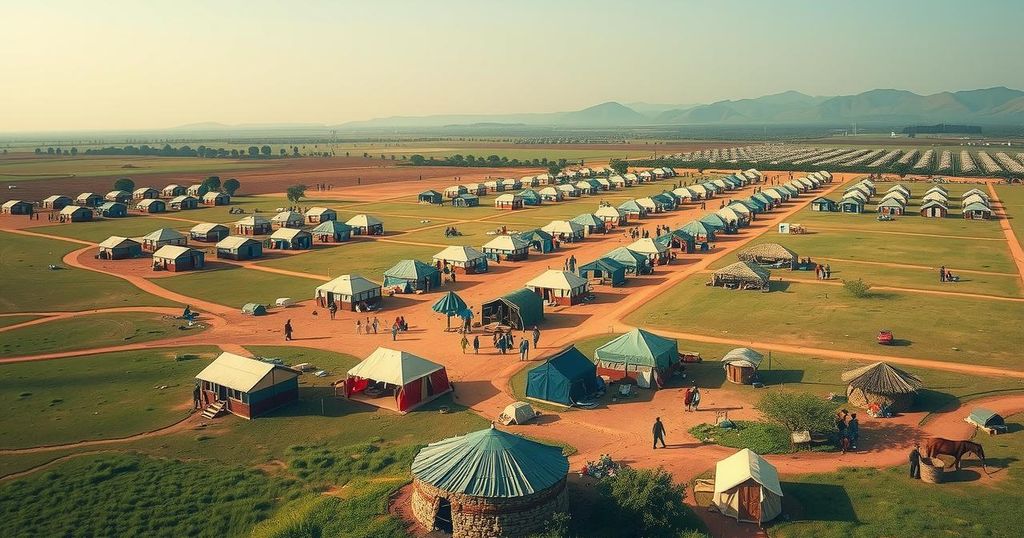Examining Health Challenges: Bhavya Joshi’s Research in Kakuma Refugee Camp
Bhavya Joshi, a doctoral student at UC Berkeley, is conducting vital research on the reproductive health needs of South Sudanese women in Kakuma Refugee Camp. Utilizing a community-based participatory research approach, she engages local women in the research process. Her findings highlight critical challenges in maternal health and the impact of compounded crises, emphasizing the need for inclusive interventions to enhance health services for refugees.
In July, Bhavya Joshi of UC Berkeley’s School of Public Health embarked on a significant 500-mile journey to Kakuma Refugee Camp, which houses over 290,000 refugees. This camp, established in 1992, primarily serves those fleeing violence and conflict in countries like South Sudan. Joshi’s research, aimed at understanding the health needs of South Sudanese women, is vital amid challenges exacerbated by armed conflict, climate change, and the COVID-19 pandemic.
Joshi employs a community-based participatory research (CBPR) approach, ensuring active engagement of the refugee women in her study. This methodology highlights the importance of including marginalized communities in health research, a principle Joshi embraces due to her personal background and experiences in India. The UN has highlighted alarming maternal mortality rates in South Sudan, where practices concerning reproductive health are often deprioritized, further emphasizing the necessity of Joshi’s work.
Her initial findings indicate substantial issues, such as limited access to maternal care, lack of trained healthcare providers, and the absence of cervical cancer screenings. Joshi notes that socioeconomic challenges push women into transactional sex for survival and exacerbate risks related to gender-based violence. Subsequently, these compounded crises necessitate serious attention to women’s reproductive health needs.
Raised in New Delhi, Joshi’s upbringing was marked by strong familial support and experiences of gender-based violence, propelling her commitment to advocating for women’s rights globally. With degrees in political science and international law, she has focused her research on health care in crisis settings, preparing her for her current work in Kakuma.
Collaborating with local organizations, Joshi has created a research team of six young women from the camp, who collectively contribute to data collection. This engagement enriches the research process and fosters community ownership of the findings, an approach that resonates with participants.
During a presentation of preliminary research results at Kakuma, the positive community response highlighted the importance of collaboration. Participants engaged actively, providing feedback that demonstrated their vested interest in the outcomes. Such community involvement is integral to ensuring that their voices are heard and respected.
Joshi also met with health professionals like Christine Simiyu from the Kenya Red Cross, who highlighted the complexities women face in managing reproductive health against a backdrop of basic survival needs. Issues around family planning are coupled with cultural expectations, making education and male involvement crucial to effective interventions.
Joshi envisions combining focus group discussions about family planning with broader educational initiatives. Her ongoing research might also extend to educational strategies targeting child marriage and menstrual health among adolescents. The collaborative effort aims to improve access to reproductive health services in crisis settings.
After concluding her visit to Kakuma, Joshi prepares for a meeting in Nairobi to discuss her research findings with various health stakeholders. The insights gathered from her work are anticipated to drive policy changes to better address the reproductive health needs of refugees, ultimately contributing to improved health outcomes in Kenya.
In summary, Bhavya Joshi’s research at Kakuma Refugee Camp underscores the critical need for community-based approaches in addressing the health needs of marginalized populations, especially women. Her collaborative methodology not only enriches the research process but also empowers the community to engage in discussions around vital health issues. Given the alarming maternal health statistics in South Sudan, Joshi’s work is pivotal in shaping informed health interventions and policies aimed at improving reproductive health and addressing compounded crises faced by refugees.
Original Source: publichealth.berkeley.edu




Post Comment